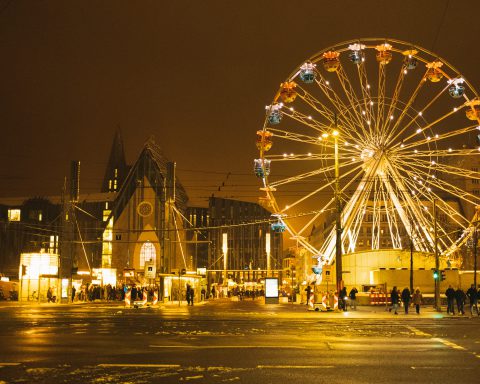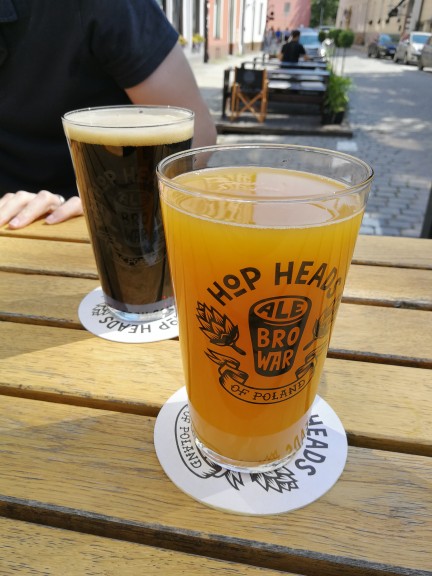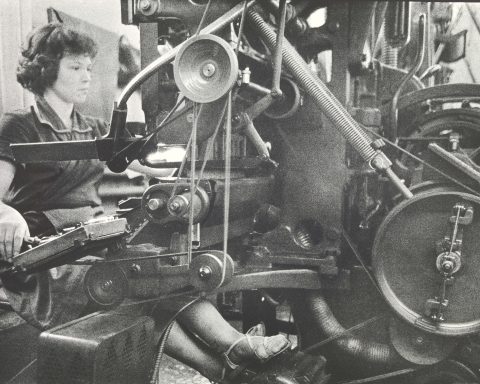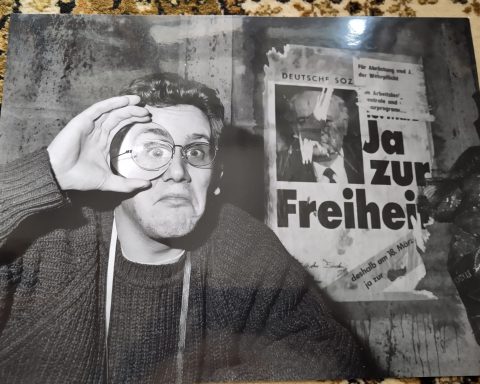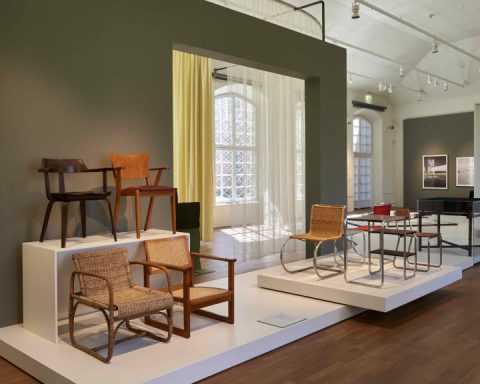The Leipzig that I know best, and adore, is defined by the underbelly of anarchist spaces and project houses, and the creative minds that are drawn here from all over the world. For cheap rent or whatever caveat, they make this city interesting and vibrant. Not to forget the ferocious culture of unity that has long been ingrained here:
In 2018, they call it Antifa.
In 1989, Peaceful Revolution.
In 1953, Uprising.
In 1933, the Nazis didn’t win here.

The city of Leipzig has re-emerged and been rebuilt several times – each time, finding its groove as a multicultural safe cradle for life and living freely.
The presence of the international trade fair is a factor.
Yet, even before the 12th century, there are records of Sorbs and Saxons living side by side on this land in a rare peace. The traces of this early tolerance remain in the remnants of long-assimilated Sorbian culture: Plagwitz cool; Lake Kulkwitzer; even the name Leipzig itself.

However, to live in Leipzig today is to be incapable of escaping the totalitarian hands that have destroyed it. There is irony in the Nazi bullets that mark the Völki. Stagnation and comfort have never lasted here. An intense cycle of creation and destruction has been Leipzig’s modus operandi.
Even now, with the current wave of gentrification, perhaps we’re already watching the city climb the steps from which it will inevitably fall again.
In the piece that follows, I chased this cycle back as far as I could go, to Charlemagne’s Capitulatio de partibus Saxoniae in the 8th century, and attempted to recreate the kind of Leipzig that would have been destroyed by the Franken army, and came to the conclusion that its spirit would not be wholly unrecognisable from the Leipzig we know today: free-thinking; multicultural; with the desire to party hard and often.
The advancing Holy Roman Empire would have found every aspect of Leipzig culture abhorrent, which is why they strove so hard to destroy it. Of course, Charlemagne couldn’t destroy that Leipzig spirit: and neither would the Habsburgs, Napoleon, Hitler, or Stalin.

Memoir of an Anarchist City
[page one]
[written by Leipzig Großstadt]
[abridged for your pleasure]
[Crunching sound of boots and horses on the frozen soil of a winter morning]
Chapter One: My Childhood
My first memory was the river that came down from the mountains. A white water tumbling from a hillside horizon slowed to a drift around my lowest points. Submerging my western trees and flooding the green miles behind.
It was she that brought life to my arid plains. I, just another anonymous land, suddenly in bloom and populated with flowers. Blessed by the black tide surging north to the sea.
Chapter Two: First Love
They had been crossing the skyline from east to west. A man with a moustache and his runaway bride. Binoculars and fingers that pointed to here. They fell to their knees upon reaching my river and drank from the fresh water.
He tried to catch a fish, missing. Unintentionally splashing his bride, shrieked. Laughing. Playing and fighting, they romped on the dirt until the stars came out and the moon was high. They softened and creased, salted in sweat. Spaghetti embrace and no-one else for miles.
“I’ll never leave.” the woman said to her man, with a tear and smile, golden band on her finger pressed up in that cradle of her man’s open chest. He raised a palm to touch the rise of her cheek.
“I guess we’ll have to stay.” he said, confused by the weight as he missed a step.
Chapter Three: My Family
The fire would be set on evenings like this. The smell of hot fish being smoked on a stone, strong enough to carry down the streets to the houses. Arousing the tribe to holler and dance like salivating dogs. High spirits lubricating the dusk.
Superstitious women wore flowers in their hair. Men wore moustaches for luck. Coming together inside a stone circle to chant to the sound of their drums.
“This sacred land!” they would call, “Has set us free!” drum drum drums.
A homage that would raise baritone cheers. One woman kneeled to kiss my soil and it made me blush in a strong harvest.
Chapter Four: My Friends
Approaching from the west that very evening. Hundreds of strangers cast long shadows and walked to the centre of this new town.
“Hallo, wir sind Deutsche,” said one of them, socks in his sandals. “Wir haben eure Party gehört. Können wir mitfeiern?”
My pagan tribe fell to a suspicious silence. The fire snapped and a moment passed. Smiles of the newcomers faded by the tension. “(Maybe we can try repeating to them again in English?)”
“Did you bring German beer?” asked one of my girls, flowers in her hair.
“No.” socks and sandals said, he gestured at a crate of sillywater. “Only Bavarian!”
A display of humour that raised the baritone cheers. Two gangs assimilated now with good-feeling and mingling forever, it would seem. New children, Slavic chins and Germanic noses.
—
Charlemagne:
What’s all this interbreeding nonsense…
[The year is 0782]
[Crunching sound of boots and horses on the frozen soil of a winter morning]
[Halts]
Soldier 1:
The edge of your kingdom, my sweet Lord. We await your gracious instruction.
[Charlemagne, King of Franks, in a royal carriage wearing frilly pyjamas]
[engrossed in a book, titled ‘Memoir of an Anarchist City’]
[by Leipzig Großstadt]
Charlemagne:
[muttering to himself as he reads] Pagan parties, alfresco shagging… this can’t be real life. Idealistic pie-in-the-sky. Who pays for all this? What is this lefty claptrap story?
Soldier 1:
My king, please. Hasten the angelic guidance.
Charlemagne:
Whuh? [looking up from text] Where the devil are we, men?
Soldier 1 :
West bank of the Elster basin, sire. Primitive land ahead. Your mighty warriors, their honest steeds, stand on the edge of unenlightened Saxonia. The Lusatian settlement of Lipsk now lies under the shadow of our Holy Roman maw and is awaiting decimation at your divine signal.
Charlemagne:
Wait, wait… we’re in Leap-seesh, you say? [Glances at the spine of the book in his hand] How are you spelling that… no, change that name. Make it easier. Make it feel good against my regal tongue.
Soldier 1:
What do you think of ‘Leipzig’, Special One?
Charlemagne:
Never been. Bring me solutions not problems, lad. Now give me my peace. I should not be unnecessarily stressed or disturbed like I am. A king’s skin must maintain the texture of pure cream cheese. (I read an article about it in The Scribe, you know.)
Soldier 1:
But heavenly Father, your men are restless for glory, perhaps the horses too. Give us your blessing to rape and pillage until we are sated.
Charlemagne:
Blessing granted, don’t stop for lunch… and while you’re having fun, remember the vital aspects of cultural genocide. Exterminating faith is what breaks the mind. It is the purpose of a real crusade. The barbarians here must learn subservience to a higher power. They must learn to kneel. Convert or be converted to dust. We must control the narrative. Make them write our story.
[Commence: the sound of slaughter]
Charlemagne:
Now, where were we…
—
Chapter Six: Further Education
Frantic sounds like pleading as blood spilled on the lawn. I watched the death stack up in thousands. Friends and socks and sandals, Sorbian moustaches, family corrupted in the colour of red roses burned by orange fire.
It was announced next day by bugle. Outsiders in metal armour had declared I for them with weapons like fear of the swinging mace, the laugh of sadism. It hardened every human face until they all resembled stone. Belligerent force used these stones to build anew.
With the fires of before now over, legends to comfort children. They were screaming at the western trees blocking the sun and drowning themselves in the river to escape control. Leipzig is gone, they all said. Except the little ones with hope.
—
Charlemagne:
[closes the book]
[and holds a pen with a smile]
© 2018 Adam Carrington

WINNER: 1003 NIGHTS (OF LEIPZIG) LITERARY CONTEST – MIXED GENRE
About Adam: “I started this decade as a guitar player. I was cutting my teeth in the Glasgow bars. The plan was to never stop. However, one’s twenties will either fly straight ahead to the suburbs or take off somewhere weird. The latter happened. Now I’m 28, crashing mattresses in Leipzig and writing fiction, after having chased other configurations of life and love to natural conclusions, and finding that these are simply my favourite things.”



